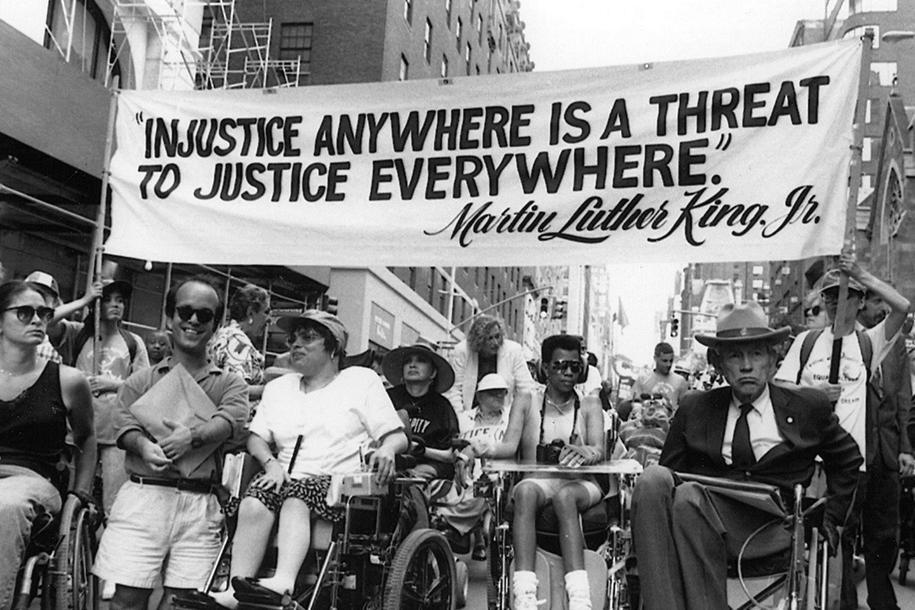Photo credit: Judy Heumann pictured alongside members of Disabled In Action, a disability justice organization she founded, protesting Section 504 in Madison Avenue, New York in 1970. (Source: Tari Hartman Squire)
Editor’s Note: This guest blog was authored by Jessica Mathis, executive director of Mixed Greens Savannah and in partnership with the American Association of People with Disabilities (AAPD) and REV UP Georgia. State Voices is grateful to Mathis, REV UP, and the AAPD for sharing this piece as a special feature for Women’s History Month and Disability Awareness Month.
On Wednesday, March 8, 2023, pioneering disability rights activist Judith “Judy” Heumann passed away at the age of 75. Although I did not get a chance to know Ms. Heumann, I am thankful for her life and advocacy for disability and civil rights.
Commonly known as the “Mother of the Disability Rights Movement”, Judy Heumann contracted polio in 1949 at the age of two. As a child, the Brooklyn native was denied the right to attend school because she used a wheelchair. Then as an adult, Heumann sued the New York Board of Education for denying her employment on the basis of disability discrimination; Heumann won and became the first person in a wheelchair to be certified as a teacher in the state of New York. In the 70s, Heumann protested President Nixon’s veto of the 1973 Rehabilitation Act and held sit-ins to demand the passage of Section 504, which protects the rights of people with disabilities who participate in federally-assisted programs and activities. Heumann also advocated for the Individuals with Disabilities Education Act (IDEA), which codifies the right to a free, quality, and appropriate education and special education services for children with disabilities in the US.
The impact of Heumann’s life and legacy will be felt and remembered by many all over the world. Heuman’s work to end discrimination and gain equality for people with disabilities blazed a trail for many disability advocates. She showed us that you can achieve anything that you want to, and that we can turn our pain into power.
Recognizing the contributions of women like Judy Heumann is important to the disability rights movement because it disrupts the historical narratives and images of male-dominated leadership in our freedom movements, and, secondly, it empowers women with disabilities by letting them know that they can change the world.
As we know, our fight for a world where every person is politically and economically empowered, and everyone is free to thrive in our full dignity is ongoing. And there are so many more women who’ve made an incredible impact by blazing their own paths in these movements. This Women’s History Month, we’re harnessing power and legacy in their intersecting stories.
Harriet Tubman, the Great Liberator
Born around 1820 in Dorchester County, Maryland, the Great Liberator, Harriet Tubman, is most commonly known for leading hundreds of enslaved peoples to freedom through the Underground Railroad.
A lesser known fact about Tubman is that she had a disability. At age 12, she was struck in the head with a two-pound weight by her master; the blow left her with physical scars, narcolepsy, and recurring seizures.
Despite her disabilities, Tubman became an abolitionist and social activist. During her lifetime, Tubman made 13 trips and freed nearly 800 hundred slaves in South Carolina and was also a spy during the American Civil War. In this, she found new ways to fight and assisted fugitive enslaved people in the Civil War.
Although the Disability Rights Movement started over a century later, it has deep connections to Tubman”s legacy as the Great Liberator.
For people with disabilities, the state of slavery does not just refer to experiences of physical bondage and subjection to physical violence. It also includes the experience of holding people against their will in institutions, forcing them to believe that they are inferior, and treating them as less than human.
Rosa May Billinghurst, Suffragette, and Voting Rights Crusader
Another early disability rights advocate was Rosa May Billinghurst. Billinghurst was born on May 31, 1875 in Lewisham, England. As a child, Billinghurst had polio, and in her adult years, she studied social work and became an advocate for people with disabilities who lived in institutions.
In 1907, Billinghurst joined the Women’s Social and Political Union, a militant organization that campaigned for women’s suffrage in the United Kingdom. Eventually, Billinghurst started the Women’s Political Union Chapter in Greenwich, England. During protests, she would ram police with her tricycle wheelchair. This women’s rights activist was most known for “Black Friday,” where she along with 300 hundred other activists, demanded to speak with the governor but was denied by police. She continued her fight for gaining women the right to vote and later joined the Women’s Freedom League, which was against taxation and the national census.
Although American white women gained the right to vote in 1920, African Americans did not gain this same right until 1965. And today, we know that protecting that right for Black Americans and people with disabilities is a battle that still has to be fought and won. Under the new restrictive election laws in many states, anyone who uses an absentee ballot has a shorter period of time to submit their request form and their vote. This shortened period of time to turn in an absentee ballot request form makes voting inaccessible to people with disabilities. It does not give us enough time to arrange for transportation and gives no consideration for those that have medical challenges.
Jazzie Collins, Disability + LGBTQ+ Justice Champion
The last modern heroine is Jazzie Collins, born on September 24, 1958, in Memphis, Tennessee. Jazzie Collins was an HIV-positive transgender woman who fought for social and economic justice in California. During her lifetime, Collin’s activism covered a range of issues, including disability justice, senior rights, tenants’ rights, LGBTQ+ protections, fair labor, and living wages.
While living in San Francisco, one of the groups she worked with was Seniors and Disability Action (SDA), an organization that mobilizes people with disabilities, seniors, and their allies to fight for their individual rights and social justice through personal support and collective action. Collins was also a co-founder of Queers for Economic Equality Now (QUEEN) and organized the 6th Street Agenda food pantry to combat poverty and housing insecurity.
Ms Collins’ life shows us the power of grassroots and community advocacy because like the other women discussed, she had the passion to fight against injustice. Most importantly, each one of these advocates refused to let systematic discrimination and ableism stop them; they used negative experiences to activate others and change perceptions about people with disabilities. Their fights for justice and liberation for disability, LGBTQ+, and BIPOC communities are ones we are deeply grateful for, and their legacies will live on.



